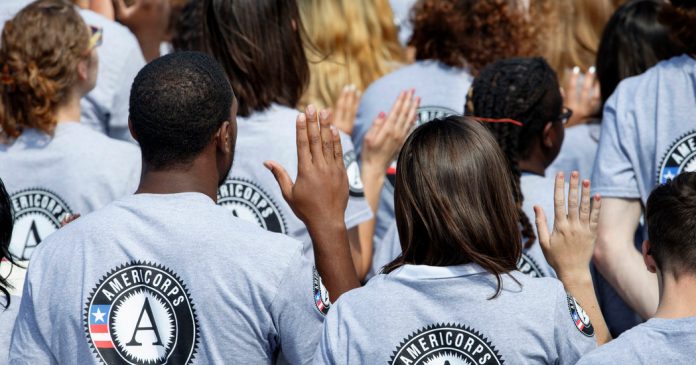David Brooks writes about this topic in the Op-Ed “We Need National Service. Now.”:
There is now a vast army of young people ready and yearning to serve their country. There are college graduates emerging into a workplace that has few jobs for them. There are more high school graduates who suddenly can’t afford college. There are college students who don’t want to return to a college experience. This is a passionate, idealistic generation that sees the emergency, wants to serve those around them and groans to live up to this moment.
Suddenly there is a wealth of work for them to do: contact tracing, sanitizing public places, bringing food to the hungry, supporting the elderly, taking temperatures at public gathering spots, supporting local government agencies, tutoring elementary school students so they can make up for lost time.
The Op-Ed discusses a bill put forward in the Senate by Chris Coons, a Democrat from Delaware:
As a young man, Coons launched one of the first AmeriCorps programs, leading 150 members in 15 cities who tutored students in inner-city schools. Later, he created another AmeriCorps program with a local volunteer fire department in Delaware. “It was the most inspiring thing I’ve ever been a part of,” Coons told me.
His bill would double the current number of AmeriCorps volunteers in its first year, from 75,000 to 150,000. Then for years two and three it would double the number again, to 300,000. It would also increase AmeriCorps stipends, which are now as low as $15,000 a year, so the volunteers can have a living wage.
The Coons bill is an excellent start. But it needs to be bigger and bipartisan. Under AmeriCorps, the federal government provides money for the volunteers, matched by private funding. State commissions supervise most programs, and the volunteers work through nonprofits and local agencies. The downside is that the big, well-established nonprofits have a significant advantage when it comes to receiving AmeriCorps volunteers.
There are a lot of great smaller organizations that just don’t have the organizational infrastructure to take part. There are many parts of the country, especially in rural America, where volunteers are relatively thin on the ground. National service has never had confident bipartisan support because Republicans don’t have constant contact with volunteers in their own districts.
The Op-Ed continues:
And as we all know, the benefits of the program accrue not only to those being served but also to those doing the serving. What would it mean to the future social cohesion of this country if a large part of the rising generation had a common experience of shared sacrifice? What would it mean to our future politics if young people from Berkeley spent a year working side by side with young people from Boise, Birmingham and Baton Rouge?
On the other hand, has any nation prospered that did not encourage in each new generation the habits of work, the taste for adventure, a sense of duty and a call to be of use to neighbors and the world?
We Americans suck at regimentation and blindly following orders from the top down. But we’re pretty good at local initiative, youthful dynamism and decentralized civic action. We need a Covid response that fits the kind of people we are. National service is an essential piece of that response.
Students, read the entire Op-Ed, then tell us:
Do you agree with David Brooks, the writer of the Op-Ed, that the United States should greatly expand national service programs for young adults? Why?
Should a national service program be mandatory? For example, should high school or college graduates be required to serve one year of national service in the military or in a civic organization? Do you believe that mandatory national service would create a sense of patriotism or national unity? Or, would it be undemocratic? What might be other advantages and disadvantages of requiring national service?
Have you done any volunteer or community service work? Was the community service required by your school? What was your experience like?
In the comments section of Mr. Brooks’s Op-Ed, many Times readers did not think that young people should have to make substantially less money doing national service. How do you think people participating in a national service program should be paid?
Mr. Brooks argues that the current coronavirus pandemic is an example of when national service could be useful. How do you think young adults could serve the country right now?
Students 13 and older are invited to comment. All comments are moderated by the Learning Network staff, but please keep in mind that once your comment is accepted, it will be made public.









